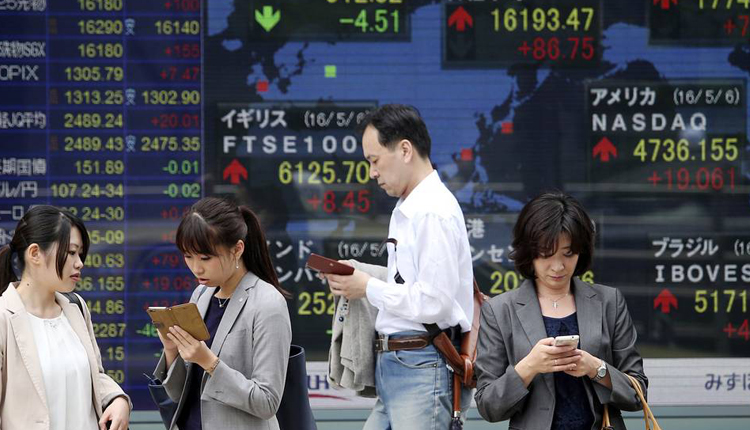Asian shares mostly climbed on Tuesday after markets in the region slipped in the last session, as U.S.-China trade jitters weighed on sentiment after Beijing threatened retaliation last week.
Japanese shares edged higher, with the benchmark Nikkei 225 adding 0.67 percent. Most sectors were in positive territory, with the telecommunications sector rising 2.19 percent to lead gains.
South Korea’s Kospi, meanwhile, tacked on 0.29 percent. Technology traded higher, with Samsung Electronics higher by 1.86 percent, while financials and retailers came under pressure.
Chinese stocks tracked higher following Monday’s slide, which saw trade uncertainty dampen investor sentiment. The Shanghai Composite added 1.43 percent and the blue-chip CSI 300 was up 1.53 percent.
Hong Kong’s Hang Seng Index rose 0.78 percent, extending gains made during the Monday session that had snapped a five-day losing streak. Energy as well as property and construction led the advance, with Petrochina up 3.16 percent and Country Garden jumping 4.22 percent.
Elsewhere, Australian shares eased ahead of the Reserve Bank of Australia’s interest rate decision due at 12:30 p.m. HK/SIN. The S&P/ASX 200 slipped 0.37 percent as declines in the materials and telecommunications subindexes weighed on the broader index.
MSCI’s index of shares in Asia Pacific outside of Japan traded higher by 0.36 percent in afternoon trade.
“When I’m talking with domestic Chinese investors, they’re very bearish at the moment, not just about their market but about the world. And what I’m finding a lot of people talking about is the fact that the U.S. yield curve is flattening, it’s probably going to get inverted if the Fed keeps tightening,” Mark Jolley, global strategist at CCB International Securities, told CNBC’s “Squawk Box.”
Apart from that, investors were also worried over the motivation behind the U.S. administration’s current trade policy, Jolley added.
The mixed showing in Asia came after U.S. stocks rose on Monday as investors shrugged off trade uncertainty and focused instead on corporate earnings news.
Investors stateside had come into the earnings season with high hopes as FactSet had forecast year-over-year profits to grow by 20 percent in the second quarter. So far, second-quarter earnings have grown by 24 percent through Friday.
The Nasdaq Composite gained 0.61 percent to finish the session at 7,859.68, recording a five-day winning streak which was its longest since May. Other U.S. indexes also posted gains.
That compared to slightly more downbeat sessions seen in Asia on Monday after China last week said it was preparing to impose duties, ranging from 5 percent to 25 percent, on around $60 billion in U.S. imports. Beijing said those tariffs would take effect if the U.S. went ahead with imposing more duties on Chinese goods.
Chinese state media claimed the country was being “rational” in its countermeasures, which came after U.S. President Donald Trump asked trade officials to consider increasing proposed tariffs on $200 billion in Chinese goods to 25 percent from an earlier announced ten percent.
Both the Shanghai and Shenzhen Composite were in bear market territory at the end of Monday, with the benchmark Shanghai share average closing down 1.26 percent in the previous session.
Those trade tensions gave support to the dollar, which broadly firmed overnight. The dollar index, which tracks the dollar against a basket of currencies, held onto Monday’s gains to last trade at 95.347.
Also of note, the British pound nursed overnight losses after sliding on concerns over Brexit. Britain’s international trade minister Liam Fox said there was a 60 percent chance of Britain leaving the European Union without a deal, AP said. The pound traded as low as $1.2920 overnight before paring some losses to trade at $1.2940 at 12:12 p.m. HK/SIN.
Among individual movers, shares of China Evergrande Group popped 13.7 percent in Hong Kong after the developer announced in a Monday update that it expected net profit in the first half to rise by more than 125 percent compared to one year ago.
Source: CNBC


